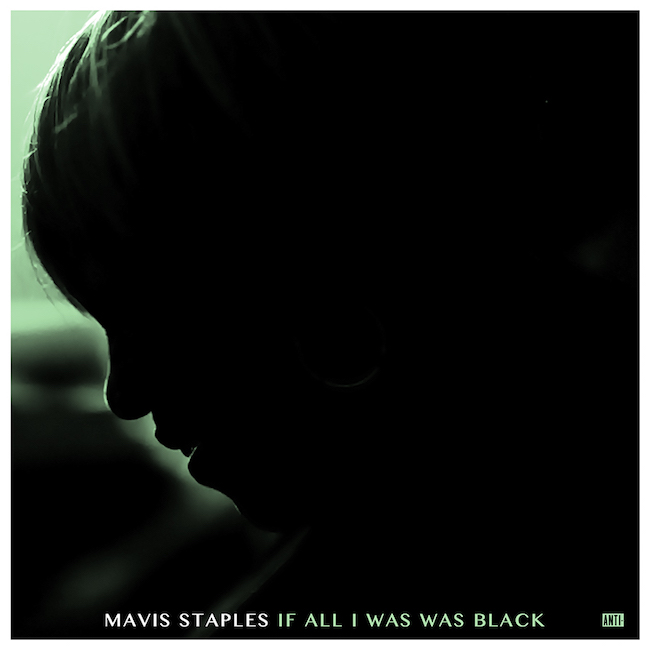Little Bit sets the tone decisively with an unflinching bass line to ramp up the tension. The accusatory tone is warranted. The song’s topic is systemic racism, specifically police shootings: “poor kid they caught him without his license/that ain’t why they shot him/they say he was fighting/So?” No-one is fooled by the official narrative, but nor is there hopelessness: “maybe you’re confounded/what is there to do?/a little bit from you/a little bit from me/simple as it gets/we set each other free.” A superb guitar solo and rising gospel harmonies underscore the call to action.
If All I Was Was Black shows that the previous song was no one-off. Staples is clearly out to confront racism head on, reducing prejudice to its simplest terms: “don’t you wanna know me more than that? All the love I give/I got natural gifts/I got perspective.” The song is sweet and positive, a powerful bulwark against hate, and ringing with the sentiment “it’s time for more love.”

Although the previous track is about reaching out, that does not mean being oblivious to realities or being silenced by them: “they lie and they show no shame/now hold back, mama, don’t explode/we don’t wanna rock the boat – Who Told You That?!” Funk guitar work surrounds Staples’ accusatory tone when it comes to the idea of simply accepting the status quo.
Ain’t No Doubt About It is a duet with the album’s producer and songwriter, Wilco’s Jeff Tweedy. The song really underscores the multi-racial, multi-generational nature of the record. The duet feels like the a response to Lean On Me: “all the things I worry about/very few of them come true/and when they do/I call on you.” It’s a song of support and sharing.
Peaceful Dream is powerful in its simplicity, with gospel vocals and claps backing the compelling refrain “come and share my peaceful dream.”
No Time For Crying has rattlesnake-like instrumentation, and that determined tone is reflected in the lyrics: “people are dying/bullets are flying/no time for tears/we’ve got work to do.” Staples speaks directly to the listener – “are you with me?” – while the funky bass line gives the steady pace of a work song. The hard stop underlines the impact.
Build A Bridge draws attention with a Prince style falsetto. It’s biting and so clearly of our time: “when I say my life matters/you can say yours does too/but I bet you never have to remind anyone to look at it from your point of view.” Yet again, hate is not allowed to trump love. Staples is sure that the solution is love: “gonna build a bridge right over the ocean/I’m coming right over for you.” She sings of bridges of inclusion, not walls of division.

We Go High is also of our times, building Michelle Obama’s phrase into the lyric: “we go high/when they go low/I know they don’t know/what they’re doing …I know they’re still human and they need my love.” Lest this seem like some sort of superhuman version of turn the other cheek, there’s admission of frustration:”I have a mind to bury them whole when they go low to tell you the truth.”
Try Harder continues the idea of self-analysis: “there’s evil in the world and there’s evil in me/don’t do me no good to pretend I’m as good as I can be.” The blues repetition with a fuzzy rock riff reinforces Staples’ and Tweedy’s central philosophy of striving to be better while lifting others up.
All Over Again is a reflective piece that ties the album together beautifully. It has a gentle blues feel but it’s positive, of course: “sometimes I have regrets but I ain’t done yet/I’d do it all over again/with the stars all closing in.”
It’s a nod to Staples’ age, with which comes with a unique perspective. In 1964, she thought her family was going to be lynched in Arkansas after a being stopped at 1:00 a.m. by police with guns and dogs. A racially motivated false accusation was resolved because the police chief recognised the Staples Singers and could help verify their story.
Staples became a civil rights activist but, despite the progress made over the next sixty years, “nothing has changed…we are still in it,” she said. As is hinted throughout the record, Staples remains willing to speak truth to power: “some people are saying they want to make the world great again, but we never lost our greatness. We just strayed into division.”
It’s that backdrop that informs the album and Tweedy’s compulsion to write for a fiercely loving voice, a realist that wants to raise others up rather than being beaten down: “I want you to feel that same compassion…You can’t stop me. You can’t break me. I’m too loving. These songs are going to change the world.”